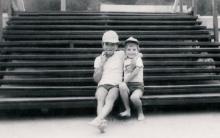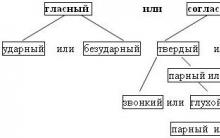At school, we were all forced to read A. S. Pushkin’s novel “Eugene Onegin.” But at this age, most children are unlikely to think about the deep meaning of this work, looking at the relationship between Onegin and Tatyana through the prism of their sensory experience. However, many critics cannot understand the author’s ideas, preferring to limit themselves to a superficial analysis of the characters’ actions exclusively, without focusing on the spiritual component.
Antithesis
At first glance, it may seem that the two central characters of Eugene Onegin are opposed to each other. Tatyana Larina is a highly moral, spiritual person, she is pure in spirit and body. And Onegin is a St. Petersburg dandy, sophisticated and already familiar with passion and its consequences. They are attracted to each other, like charges of the same name, a certain mutual understanding arises between them, because both have outgrown their environment and are looking for the truth in something else, incomprehensible and even frightening.
Features of education
A comparison of Onegin and Tatyana can begin by considering the conditions in which they grew up. Pushkin's favorite was born in a rich house, albeit located in the wilderness. In infancy and childhood, she was looked after by a nanny chosen by her parents from the peasants who lived nearby. She sang lullabies, told fairy tales and, of course, read prayers over the girl. This tied Tatyana to the people more than anyone could imagine. Thoughtful and silent by nature, the girl spent little time with her peers and avoided noisy games and fun. She was more interested in books, contemplation of nature and reflection. The youngest daughter of the Larins lived according to folk customs, got up early to catch the dawn, believed in omens and performed traditional rituals, despite her religiosity.
Onegin grew up in European society. His nanny was replaced by a tutor, who raised the boy according to his idea of a secular man. Having matured early, Evgeniy plunged headlong into a brilliant and noisy life, acquiring the status of a young rake. Education and love for popular authors gave him charm and promised the favor of the ladies. He quickly understood all the intricacies of sensual love and learned to manipulate them. I began to be skeptical about the manifestation of humanity, kindness, and compassion. He criticized and questioned everything that happened to him and around him, as European authors advised.
The world through the window
The characterization of Tatiana in “Eugene Onegin” cannot do without mention of nature. Describing panoramic views, Pushkin does this as if looking from the window of the room belonging to the main character. Any landscape in the novel reflects the girl’s state of mind. As the plot develops, not only the time of year and the weather outside changes, but also that part of the day that Tatyana spends thinking about her chosen one.
Byronic and sentimental literature

You can also trace the differences between Evgeny and Tatyana by the books they read. For Onegin, Byron was an example to follow, who looked at the world ironically and skeptically. This is exactly how the ideal man seemed to the young man. Selfish, charming, a little sarcastic and caustic. European literature of that time cultivated a similar way of thinking.
Tatyana Larina, on the contrary, draws attention to sentimental novels that show the value of sincerity, kindness and responsiveness. Of course, they are somewhat naive for a girl who will move in high society, but the nobility and honor brought up thanks to them for many years helped her maintain herself unchanged under the influence of circumstances.
It is about the hero from a sentimental novel that a girl dreams. And when Onegin, despised and persecuted from everywhere, appears in their area, she takes him for the ideal that she has been waiting for so long.
Letter
Tatiana's letter to Onegin reflects the sublime love that the girl had for her chosen one. It is in him that one can clearly trace the characteristics of the girl’s character: sincerity, gullibility, impressionability. She has no reason to doubt her choice. For a young beauty, a union with a person like Eugene is not only the fulfillment of a cherished desire and a long-awaited reunion with a loved one, but also an opportunity for spiritual growth and self-improvement.
Onegin, on the contrary, sees in Tatiana in love only a naive, enthusiastic simpleton who was inspired by his stories and appearance. He does not take her feeling seriously, although he suspects that it will not go away so easily. Secular “games of love” prematurely made his heart immune to such signs of attention. Perhaps, if not for the rich life experience in this field, everything could have turned out differently for the couple.
Tatiana's letter to Onegin is permeated with feelings that the girl can no longer keep to herself. She admits that the gap in upbringing, education and experience between them is huge, but hopes to someday overcome it in order to be closer to her beloved.
Refusal

As you know, Evgeny refused Larina, citing the fact that he was not worthy of her, since he did not experience such lofty feelings and did not want to offend her by the immutability of his motives. According to most critics, it is Onegin’s refusal that causes rejection in the reader. This was perhaps the most noble act of his entire life, but literary luminaries look at this situation a little differently. They believe that fear prompted the young rake to refuse; reason prevailed over the feelings that the “Russian soul” Tatiana awakened in him.
Meetings

Onegin and Tatyana meet three times in the novel. The first time is when Evgeny comes to the Larins’ estate. The second is when he is forced to explain to Tatyana about her letter, and the last is on her name day, a year after the tragic events. And each such meeting changes something in Onegin’s soul, does not allow him to remain on the sidelines, to brush aside his feelings and emotions. Fearing what is happening to him, the rake prefers to leave and throw the image of the girl out of his head rather than be close to her and change.
Duel

It is the relationship between Onegin and Tatyana that makes the character of the work somewhat gloomy. The main character is angry: at himself, at Larina, at his best friend Lensky, at the fate that brought him to this estate, at his uncle, who died at such an inopportune time. This pushes him to do reckless things, such as flirting with Olga. Of course, a duel was necessary, but killing each other was not necessary. However, events developed in such a way that, due to an ever-increasing feeling of hatred, Vladimir had to depart to another world.
Last ball

The comparison between Onegin and Tatyana continues throughout the last scene of the novel. The name day ball at the Larins' estate seems to copy the girl's terrible dream about her wedding with Evgeniy. A sick, dissatisfied man, oppressed by remorse, is surrounded by grotesque characters who contrast so much with his inner world that it seems as if they are mocking him.
Unable to bear these torments, Onegin leaves, citing the fact that he was overcome by wanderlust.
Petersburg

Very little time has passed, and the main characters meet again, this time at a social event in St. Petersburg. The relationship between Onegin and Tatyana has remained virtually unchanged. They have become more complex, but the internal heat still continues to pulsate in both. Larina got married, became a princess and now holds her head high. Now there is no trace of that village girl who passionately confessed her feelings to the young rake.
The situation turns against Eugene, as he realizes that he is in love and suffers from it. He writes letters to the object of his adoration, tries to return everything back, but the girl is adamant. This is how Pushkin sees this situation. Onegin has feelings for Tatyana, but now she is trying to avoid a relationship. Ultimately, the girl denies the man a secret relationship, citing the fact that she swore an oath to be faithful to another man, despite the fact that she still loves Evgeniy. This puts the finishing touches on the novel, but, according to some critics, the ending still remains open.
The relationship between Onegin and Tatyana was complicated, they were stained with the blood of a friend, refusals and confessions... But in the end, their love continued to live even when they signed her death warrant together.
1. Contrast the metropolitan and rural lifestyles.
2. Onegin and Lensky.
3. Contrast between Tatiana and Olga.
4. Tatyana is an inexperienced village young lady and socialite.
It is easy to notice that one of the main principles that guided A. S. Pushkin when writing his novel in verse “Eugene Onegin” is opposition. This is a contrast between the characters of the characters and a contrast between two lifestyles - urban and rural, metropolitan noise and quiet solitude. This is how Eugene Onegin’s father lived:
Having served excellently and nobly,
His father lived in debt
Gave three balls annually
And finally squandered it.
And Onegin’s uncle at that time led a measured and monotonous life on his estate:
...Village old-timer
For about forty years he was quarreling with the housekeeper,
I looked out the window and squashed flies.
...Onegin opened the cabinets:
In one I found a parish notebook,
In another there is a whole line of liqueurs...
Pushkin shows the huge difference in the interests of the urban dandy and rural landowners. Of course, Onegin has a rather superficial education, but he has read a lot of books, can talk about economics, express his opinion about ancient poetry, and even quote a few stanzas in Latin. And rural landowners conduct simple conversations “about haymaking, about wine, about the kennel, about their relatives.”
It should be noted that Onegin himself emphatically contrasts himself with the society of his village neighbors: as soon as he hears how one of them is coming to visit him, he mounts his horse and leaves home.
Vladimir Lensky, a young landowner who arrived on his estate at about the same time as Onegin, is, of course, a completely different person and range of interests than the rest of the village residents. He is an educated man (Pushkin mentions that Lensky studied at the famous University of Göttingen in Germany), and is interested in philosophy and poetry. That is why Onegin and Lensky, despite the great dissimilarity of characters, became friends. They had a lot to talk about. But, if you look more closely, Onegin and Lensky were antipodes to a greater extent than Onegin and some “village old-timer” like his late uncle:
They got along. Wave and stone
Poetry and prose, ice and fire
Not so different from each other.
Onegin is a person satiated with pleasures, equally yawning “among fashionable and ancient halls.” He is still able to appreciate the sincerity and strength of Tatyana’s feelings, but he does not want and cannot share them, since his soul has lost spontaneity and faith in happiness.
And Lensky, unlike Onegin, sincerely believes in love and friendship. He is still very young; He devoted the years spent in Germany to study and paid little attention to reality. He cherishes lofty dreams, but he has not yet encountered the inconstancy and meanness of people:
From the cold depravity of the world
Before you even have time to fade,
His soul was warmed
Hello friend, caress girls.
And if Onegin locked his heart to feelings, then Lensky was in love, “like people no longer love in our years.” Of course, Olga is very sweet - with the charm of youth, liveliness, spontaneity, but Lensky does not notice the character traits of his bride. He sees in her an ideal, which he glorifies. We can say that he came up with a certain image and identified it with Olga, whom he has known since childhood. In the same way, Tatyana transfers the features of the heroes of the novels to Onegin, who, despite his coldness and indifference, still noticed that “Olga has no life in her features,” telling Lensky that in his place he would choose another sister. Thus, Onegin (and Pushkin, of course) contrasts the two sisters.
Always modest, always obedient,
Always cheerful like the morning...
Eyes like the sky are blue,
Smile, flaxen curls.
A charming doll portrait, but don't look for depth or consistency in it! And how does Pushkin draw Tatiana, his favorite heroine? She is not at all like her sister: thoughtful, silent, dreamy, she has loved solitude since childhood:
Not your sister's beauty,
Nor the freshness of her ruddy
She wouldn't attract anyone's attention.
Dick, sad, silent,
Like a forest deer is timid,
She is in her own family
The girl seemed like a stranger.
The dissimilarity between the sisters is also evident in the way they approach love. Olga, a cheerful playful girl, can calmly flirt with others in the presence of her fiancé. And when the ill-fated Lensky dies in a duel with Onegin, Olga quickly finds consolation and marries a lancer. It is unlikely that she remembered her first love for a long time.
Tatyana's attitude towards her suddenly flared up feelings for Onegin is completely different. The heroine not only takes her feelings for Onegin seriously, she sincerely believes that this is fate, that this is for life. It is in this attitude to love that the explanation is rooted that the girl herself decided to write a letter to the young man and confess her feelings, although in those days this was considered a bold offense. And even when Onegin rejects Tatiana’s love, the girl continues to love him. When she becomes a princess, a society lady, she still does not forget her first and only love.
But if deep down in her soul Tatyana remains the same, then her manners change so much that Onegin barely recognizes in the princess the village girl who once confessed her love to him. Onegin told her: “...learn to control yourself.” Well, she learned this science well! Previously, everyone could have noticed Tatiana's confusion (if only the attention of the guests at her name day had not been distracted by a fatty pie). Now no one can read on the girl’s face what is happening in her soul. Perhaps the meeting with Onegin at a social event stirred up memories in Tatyana of her former life and naive girlish dreams, but she did not betray her feelings in any way:
Onegin and Tatyana change roles. Once he was indifferent to the girl, now he is looking for her attention. Once, in self-forgetfulness of feelings, she wrote a letter to Onegin declaring her love, now he writes to her. And Tatyana is cold and imperturbable. She can talk to Onegin, she can not notice him. Tatyana does not distinguish him in any way from other guests who visit her house or those houses where she visits. In those stanzas where Pushkin talks about Tatyana’s new appearance, he constantly reminds of what she was like, compares and contrasts the society lady with the former naive young lady, obsessed with reading sentimental romance novels. But at the end of the work it becomes clear that the contrast between the current and former Tatiana is purely external, conditional. Deep down in her heart she regrets the simple rural life and loves Onegin no matter what. “But I was given to another and I will be faithful to him forever,” she replies to Onegin’s love confession. Tatyana remains faithful not only to her husband, but also to herself.
Let's imagine for a moment that we find ourselves in the mid-nineteenth century. We will find ourselves in the society in which the heroes of the novel by A.S. lived. Pushkin Tatyana Larina And Eugene Onegin.
Despite the fact that Evgeniy and Tatyana lived at the same time and in the same society, their perception of this society is very different. Onegin's world is a secular world of magnificent receptions and balls, and Tatyana is a poetic, dreamy and spiritual nature. You can’t help but ask yourself: could Evgeniy and Tatyana be together? This question cannot be answered unambiguously. First you need to determine: what do they have in common?
I think the only thing they have in common is the desire to love and be loved. Perhaps they could have been together if not for the influence of the society in which they lived. A society where there is no love, where there is only a game of love. That’s why Onegin doesn’t believe in anything: neither in happiness, nor in love. The years spent in the artificial world of illusions of kindness left a certain imprint on his future life. After numerous years of his life spent in lies and betrayal, Evgeniy simply cannot believe in his happiness. This explains his tragic misunderstanding of Tatyana.
Having written a letter, Tatyana commits an unusual, bold act, not typical of a girl of that time, breaking all the rules generally accepted in her environment, since for such an act the girl could not only be misunderstood, but also slandered. But her confession was not heard by Onegin’s chilled heart. He is unable to respond to Tatyana's love, since his feelings are distorted by society. He did not understand Tatyana: she writes to him about love, and he tells her about marriage.
Onegin's confession may at first glance be very noble. He did not deceive Tatyana, but, on the contrary, immediately told her the whole truth. But if you think about it, you can say with confidence that the hero is dead in soul and has a heart of stone. Onegin with his own hands ruined the happiness that unexpectedly befell him. Perhaps he was simply afraid of love and was afraid to do or say something wrong to Tatyana. After all, at that time, many girls simply had fun with boys, without experiencing absolutely anything. This is probably why Evgeniy was afraid of such happiness.
He was always lonely, but when another person extended his hand to him, opened his heart, he turned out to be morally blind and deaf.
I think that he once dreamed of a girl like Tatyana, but over time everything changed. The society in which he lived killed everything beautiful in him that once was. It seems that Onegin is much higher than the society that surrounds him, but at the same time he is its prisoner.
The last scene is the most amazing in the entire novel. In it, Onegin still decides to tell Tatyana about his feelings, but only years later, when they met at the ball.
When Tatyana becomes a noble lady, she sadly remembers her former rural life. Tatiana still loves Evgeniy. Even upon meeting, she remained faithful to her husband.
Based on everything, I can definitely say that the relationship between Evgeniy and Tatyana could not have ended differently, since even after years they could not understand each other, and in a relationship, I think the most important thing is understanding.











About a six-day work week With a 6-day
What is a social worker?
Root hermitage in the Kursk region: the story of a miracle Root hermitage prayer service for the sick
Ceremonial signing of the agreement Ceremony of signing the cooperation agreement
Conditions and procedure for venerating the relics of St.